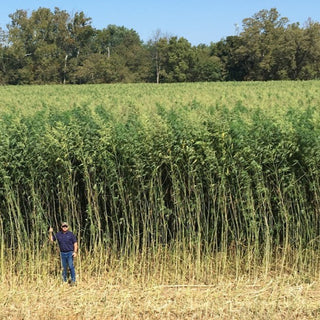Did you know how amazing the hemp plant is? Aside from a being a plant source of complete protein and tasting fantastic (especially when activated by Totally Nuts!), that is... Hemp has significant potential in many areas of industry while also topping the charts in terms of multiple environmental benefits.
Environmental benefits:
1. Carbon sequestration: Hemp plants absorb twice as much carbon from the atmosphere as trees. Hemp will take in 1.63tonnes of Carbon for every tonne of hemp produced.
2. Save water: Hemp plants are very thrifty with their water requirements. They grow in areas with chronic water shortage, providing economic and environmental solutions in disadvantaged regions.
3. Phenomenal growth rate: Hemp grows astonishingly fast - 4m in 4 months. A crop is ready for harvest in 70-90 days. This has obvious implications when paired with its other qualities such as carbon sequestration and fibre production.
4. Phytoremediation: This is a plant's ability to absorb contaminants from soil and then either store them, or transform them into harmless substances (isn't it simply amazing what plants can do??!). Hemp is great at this, especially because it grows so fast.
5. Soil improver: Hemp has been found to significantly improve impoverished soil. It encourages the activity of beneficial micro-organisms, and its deep roots help to break up compacted soil. So in areas with poor soil, farmers can still grow an economically viable crop while improving soil quality at the same time.
Uses:
Now we know how amazing hemp plants are in terms of the gifts they offer us and the environment that we have been intent on destroying for so many years. And yet there is more! Hemp has so many applications that would help to make our world even less dependent on chemicals and fossil fuels.
1. Textiles: The water footprint of hemp is approximately one third that of cotton. It also costs 77% less in terms of production costs like soil improvement, fertiliser, pesticides, and processing.
2. Hempcrete: Hemp fibres make an excellent concrete alternative. And most remarkably, it continues to 'breathe' and absorb CO2 even when it is in a wall as hempcrete!
3. Paper and wood products: Hemp produces four times as much cellulose as wood, and of course it also grows significantly quicker. Additionally, paper made with hemp does not require the chlorine bleaching process that wood-based paper does.
4. Biofuel: Hemp converts to biodiesel at an impressive 97% efficiency rate. It burns effectively and offers a realistic alternative to diesel and also the less ecologically sounds biofuel options (like soy and corn).
5. Food!: Hemp is unusual in being a plant-based complete protein (which means it contains all of the 9 amino acids that our body cannot produce itself). Hemp seeds are a good source of omega-3 and omega-6 oils, and these are present in the ratio of 3:1 which is ideal for human consumption.
To conclude....
Our culture has done so much ecological damage in such a short period of time. It seems as though the Hemp plant is here almost as some sort of remedy offered by the ever-generous Mother Earth to help us resolve some of the damage we have done. I know that is a fanciful notion, but it truly is remarkable how this simple plant that has been grown by humans for 8000 years offers so many positive solutions to our current problems.
Links:
Hemp as a potential raw material toward a sustainable world: A review.
Hemp is more sustainable than Timber

